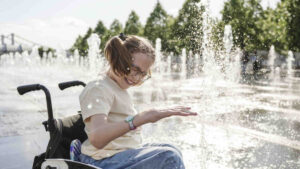Neurotech’s cannabinoid drug blazes new path for treating rare neurological disorder in kids

Neurotech's cannabinoid drug blazes new path for treating rare neurological disorder in kids. Image: Getty.
- Neurotech reports improvements in PANDAS/PANS patients after 52 weeks of NTI164 treatment
- The study highlights the safety profile of NTI164 and its potential as a therapy for the disease
- Caregivers express gratitude for significant progress observed in their children’s behaviour
Special Report: The trial of NTI164 for PANDAS/PANS demonstrates continued symptom improvement in patients after a year of treatment, prompting caregivers to express appreciation for the positive impact on their children’s overall well-being and behaviour.
Paediatric neurological disorders focused biotech, Neurotech (ASX: NTI), has released a significant clinical update regarding the ongoing open-label Phase I/II trial of its drug, NTI164.
This trial targets children diagnosed with Paediatric Autoimmune Neuropsychiatric Disorders Associated with Streptococcal Infections (PANDAS) and Paediatric Acute-Onset Neuropsychiatric Syndrome (PANS).
The latest findings show sustained improvements in patients’ clinical symptoms after 52 weeks of daily oral treatment with NTI164.
PANDAS/PANS is a rare neurological disorder predominantly affecting children. It is characterised by an infection-triggered autoimmune response and neuro-inflammation, leading to sudden and drastic changes in behaviour and personality.
These changes often manifest as obsessive-compulsive disorder (OCD), anxiety, tics, or other abnormal movements.
Currently, there are no approved therapies for PANDAS/PANS globally. Neurotech estimates the annual market for PANDAS/PANS to be valued at US$1.2 billion.
What did the results say?
The ongoing trial extension phase, involving all 15 patients who started the trial, has shown further significant improvements in illness severity (38% improvement compared to baseline) and reductions in anxiety and depression levels (45% improvement compared to baseline).
These were measured by the Revised Child Anxiety and Depression Scale – Parent Version (RCADS-P).
The results are both statistically significant and clinically meaningful, with patients transitioning from marked illness severity at baseline to mild illness and experiencing reduced clinical anxiety and depression.
Notably, no additional adverse events were recorded in any patients between the 24-week and 52-week periods.

Caregivers are grateful for the treatment
The caregivers of patients involved in the trial have provided heartening feedback.
One caregiver noted the remarkable progress of their child (called patient 008 in the trial).
“He is now building a miniature boat – this is something we could never even imagine. Prior to starting the treatment, he wasn’t able to sit on his own for more than 10 mins. We are so grateful.”
Another caregiver expressed gratitude for their child (patient 002)’s improved focus and overall well-being, highlighting the positive impact of the treatment program on their family.
“We are so happy and grateful to be a part of this incredible program. She is able to focus throughout school. She is happy and content and so are we.”
Dr. Thomas Duthy, Executive Director of Neurotech, also highlighted the remarkable and sustained response observed in PANDAS/PANS patients following NTI164 therapy.
He emphasised that NTI164 is safe and has the potential to be a helpful treatment for patients with this condition, where ongoing inflammation in the brain is often seen.
“The durable response we are seeing in our PANDAS/PANS patients is remarkable in the context of their baseline clinical symptoms immediately prior to commencing NTI164 therapy,” Dr Duthy said.
“When overlaid with the safety benefits, we believe NTI164 provides a therapeutic intervention well-suited in this patient population, where persistent or progressive neuro-inflammation is consistently observed.”
Under an extension to the original Human Research Ethics Committee (HREC) clearance, all patients will continue to receive treatment for an additional 52 weeks, totalling two years.
Key assessment tools utilised in the trial will include the Clinical Global Impression (CGI) scale, which synthesises clinicians’ impressions of patients’ global state, and the RCADS-P questionnaire, which assesses youth anxiety and depression levels.
These assessments provide valuable insights into the effectiveness of NTI164 therapy.
Overall, the positive outcomes of the trial underscore the potential of NTI164 as a promising treatment option for children with PANDAS/PANS, offering hope for improved quality of life and better management of this challenging neurological disorder.
Neurotech also making big leaps in tackling Rett Syndrome
Today’s announcement closely follows another significant trial conducted by Neurotech, this time focusing on Rett Syndrome.
Last month, Neurotech released further findings on the efficacy and safety of NTI164 from its Phase 1/2 Rett Syndrome clinical trial results.
The results showed significant additional benefits in Rett Syndrome girls after 12 weeks of daily oral treatment with its broad-spectrum cannabinoid drug therapy NTI164.
Overall, the results showed that NTI164 exhibits an excellent safety profile, with minimal patient-specific side-effects in Rett Syndrome patients.
Read more: Neurotech reports more positive Phase 1/2 Rett Syndrome clinical trial results
This article was developed in collaboration with Neurotech, a Stockhead advertiser at the time of publishing.
This article does not constitute financial product advice. You should consider obtaining independent advice before making any financial decisions.

UNLOCK INSIGHTS
Discover the untold stories of emerging ASX stocks.
Daily news and expert analysis, it's free to subscribe.
By proceeding, you confirm you understand that we handle personal information in accordance with our Privacy Policy.








